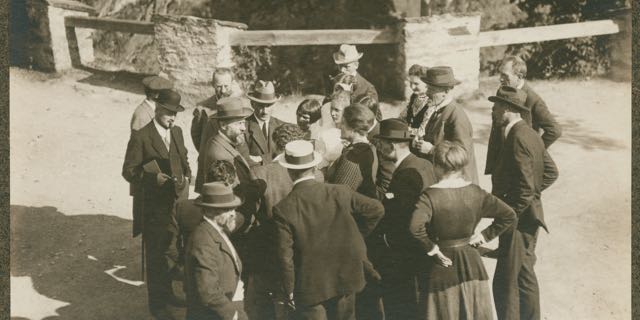After Nihilism?
“If you live today, you breathe in nihilism,” wrote Flannery O’Connor in 1955. “In or out of the Church, it’s the gas you breathe.” What makes Wendy Brown’s Nihilistic Times worth reading is that she convincingly reminds us of this situation. The attitude that nothing has essential meaning or value is pervasive in our times, always in the background of other lines of thought. “Values” make things important, worthy of care and esteem, in various ways; justice, beauty, holiness, and pleasure are examples of values. Right and left, religious and secular alike speak the language of promoting and defending values. And yet, an underlying malaise of nihilism pervades our world. While most people fluently speak the language of values, there is also a ubiquitous suspicion or fear that all values have been reduced to mere instruments, used by individuals, corporations, and governments to achieve and maintain power and personal gratification.
Brown, a political theorist of the anti-liberal left, is, of course, not the first to make these claims; they’ve been made at least since the nineteenth century. But Brown’s book—a reworking of her 2019 Tanner Lectures on Human Values at Yale University—is a timely reminder of the nihilistic air we breathe. It’s easy to lose sight of this situation, especially if we’re caught up in defending some particular worldview or policy proposal. A well-crafted reminder of fundamental features of the contemporary human condition is always beneficial. While Brown frequently signals her adherence to left-wing orthodoxy on hot-button issues, she also repeatedly shows how all sides in current political and cultural debates have imbibed a nihilistic attitude. Politicians increasingly manipulate information to sway voters, “woke capitalists” use progressive values to sell products, and students are told to treat themselves as “human capital,” who should “invest” in their own future through education, reducing themselves to mere instruments for their own gratification.
In our society’s quest to maximize utility and power, we have created systems that seem to act automatically for the perpetuation of their own power, without any real consideration of what is of fundamental importance in human life. Such systems include artificial intelligence, government and corporate bureaucracies, the surveillance state, and the global finance system. Brown’s main opponent is “neoliberalism,” the system built on a combination of market forces and “traditional morality” that she thinks drives the contemporary global order. But she is equally critical of any automated, self-propagating system that makes persons mere instruments of its pursuit of power. Nihilistic attitudes underlie ideologies from capitalist consumerism to social justice progressivism. What they have in common is that they reduce persons to being mere “cogs in economic machines and superficial individualists.” We live to serve these systems and to achieve purely “trivial, immediate, and personal” gratification. We tend to lack any sense of anything larger than our private selves, which we could love and esteem for its own sake, rather than for what we get out of it.
In our fraught political environment, I often find myself wondering who is really allied with whom, as traditional partisan and ideological alliances are increasingly shaken up. On many political and moral issues, Brown and I are vastly divided. But her book nevertheless supported an intuition of mine: one fundamental divide in our political culture, which cuts across traditional left-right or religious-secular divides, is between two attitudes towards persons.
If we wish to overcome the nihilism of reducing all values to mere instrumentality, Brown thinks we must start by seeing that in the political space values are, and always will be, at war with each other.
On the one hand, there are those who build their other views around the fundamental intuition that persons are irreducible to their place in any system: I am not “nothing but” my role in any economic or political order, or “nothing but” some social identity. Rather, I am called to live my life in light of values that transcend such systems, like beauty, goodness, justice, holiness, and truth. I am not merely an isolated individual pursuing my own interests. Instead, I am a person who is open and responsive to all of reality and to all values. On the other hand, there are those who treat persons as nothing but instruments for attaining and maintaining the power of political, economic, or religious systems. Philosophers have sometimes called the former “personalists” and the latter “totalitarians” or “nihilists.” In her basic principles, I found in Brown an unlikely but welcome personalist ally.
When Brown turns to her solution to our nihilistic situation, however, this alliance begins to fall apart. A religious thinker, like O’Connor, would note that, despite the nihilistic and cynical use of religious language by religious authorities to maintain power, religious life reveals that there is “something given and accepted before it is experienced.” Brown, by contrast, wants to overcome nihilism without relying on religion, tradition, a belief in progress, or anything else given. She thinks that, given the conflicts among values that have been endemic to our culture since the Enlightenment, all appeals to given values have been “discredited.” Like Nietzsche, she holds that no apparently given value, whether natural or apparently revelatory, provides us with ultimate meaning in life.
Brown draws inspiration for her solution to nihilism from German sociologist and philosopher Max Weber. Faced with the rise of nihilism in World War I era Germany, Weber took up the question of what it would mean to have a calling to go into politics or to be an academic researcher and educator, in two lectures: his 1917 “Science as a Vocation” and 1919 “Politics as a Vocation.” Brown agrees that thinking through these vocations provides us with an avenue to overcome nihilism. She disagrees with Weber on a range of issues, especially his anti-democratic views, and she often misinterprets him in her critiques, though she acknowledges she’s not a Weber scholar. However, Brown finds Weber to be a worthwhile partner for thinking about our times, even though she ultimately accuses him of perpetuating the nihilism he opposes. I also found Brown a worthwhile partner for thinking through these same issues, but as I’ll argue, she does the same thing.
If we wish to overcome the nihilism of reducing all values to mere instrumentality, Brown thinks we must start by seeing that in the political space, values are, and always will be, at war with each other. Politics is where we struggle for the good life, for creating a world where things have importance. We should not hope to achieve a world in which values are given or settled (as we experienced them in our Christian past, or as those who expect some perfect future state desire). Rather, we should cultivate the “grit” to create values for ourselves.
One who can show us how to do this is the charismatic political leader, a character Weber and Brown describe as having some striking combinations of personality traits. This leader derives all his enjoyment from being able to influence people, but is never egotistical or intoxicated by power. He is passionately, self-sacrificially devoted to a cause, even while he “knows” that no one can ever know that any particular cause is right, and he takes complete responsibility for his actions and their unpredictable effects while rejecting all absolute principles. He can, by his political actions, make his cause non-instrumentally valuable.
Attaining the passionate, selfless desire for achieving a cause that animates the charismatic leader requires, as both Plato and Nietzsche saw, the education of desire or eros. This introduces Brown’s and Weber’s second vocation, the academic or professor. While the political sphere is where values are struggled for, the academy is where they are analyzed, where we work out the presuppositions and consequences of any claim about values. Good professors, in Brown’s telling, help students think through the values by which they would like to live their lives. They help all of us gain clarity about the ultimate meaning of our lives, by helping us craft values together. Science and the world of facts cannot tell us how to live; science cannot tell us what to value or how to interpret its own findings. Ultimately, both vocations help us see, Brown thinks, how the factual world is meaningless, how there are many conflicting values that one can adopt, and how we must “decide” what values will guide our lives together. Only when we have adopted this attitude will we overcome nihilism, without having to rely on anything given.
We cannot overcome nihilism without rediscovering the truths that Plato saw. Both Weber and Brown are haunted by Plato, referring to him at key points in their arguments.
One could read Brown’s proposed solution as a mere bid for left-wing power. Brown recognizes that her political enemies on the right have embraced leaders who exhibit charisma, although not the Weberian sort of charisma. (Indeed, given the many contrasting personality traits that such a person needs, it’s hard to believe that Brown’s charismatic leader could ever actually exist.) Brown thinks the charisma of, say, Donald Trump, Narendra Modi, or Jair Balsonaro, perpetuates nihilism, and yet she still claims that a leftist charismatic leader could overcome nihilism. This could be read either as naivete on her part or just as a cynical bid for power for the left. The leader she wants is not someone who can help people see what they really desire deep down inside, but a leader who can create new, leftward-directed desires in people. This could easily be seen as just another case of nihilistically using values (and anti-nihilistic language) as instruments for attaining power for the left, with left-wing professors like herself serving as the intellectual vanguard.
But her proposed solution could more fruitfully be read as an exhibition of tragic grandeur. On Brown’s solution, we should all be existentialist heroes, valiantly imposing non-instrumental value on a meaningless world through our choices and desires, carving out a space of human meaning in an uncaring universe. But such a vision is doomed to fail.
If all value is an effect of human choice and desire, then it is by that very fact merely instrumental; it can be nothing but a tool for advancing those choices and desires. If man is the measure of all things, then nihilism follows as a matter of course. If there are no values given in reality, then the charismatic leader and the professor cannot do anything else but seek power, even if they deceive themselves into thinking that they are acting selflessly. Weber’s contemporary philosopher Max Scheler saw that, if Weber’s vision is right, then human life is entirely tragic: it aims to produce values that it cannot achieve, and it is blind to all the values that are given here and now. If values are not given as part of reality, if there is no real, objective justice, beauty, goodness, and so on, then nothing we can do can invent them. Nothing can give what it does not already have.
The thinker who best saw that values must be discovered, not invented, is Plato. In my view, we cannot overcome nihilism without rediscovering the truths that Plato saw. Both Weber and Brown are haunted by Plato, referring to him at key points in their arguments. Brown invokes Plato’s Socrates as an ideal for the political and academic vocations: he combines selfless charisma with a vocation to educate his students’ desires. But she fails to notice that Socrates has these characteristics because he has seen objective beauty, goodness, justice, and other values. He inculcates desire for these given values in his students. Weber invokes Plato’s idea of the experience of inspiration as the source of the two vocations. But he fails to note how the truly good politician doesn’t just have a feeling of being inspired or called, but sees the given value of political flourishing and seeks to bring it about. The one really called to be an academic perceives the given value of knowledge and responds by seeking it out.
Brown, like Plato, points us toward a personalist vision of being called to respond to higher values, but she defects from this vision, refusing to submit to given values and instead seeking to invent them. She is right to caution us about how a religious vision of reality, like Plato’s, can succumb to cynical nihilism. But ultimately, if we want to avoid nihilism, there is no other route available than a “religious” view, in Plato’s and O’Connor’s sense of a life that presupposes that there is “something given and accepted before it is experienced.” One can be a personalist and live in such a way that one moves upward to higher values, or one can be a nihilist, stuck in one’s will to power and self-gratification, and in the self-perpetuating systems such attitudes engender. There are no other options.



